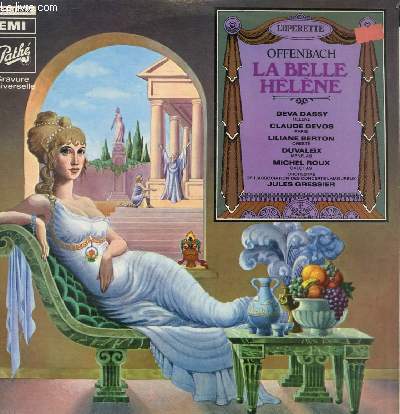"Sweet is every sound, Sweeter thy voice, but every
sound is sweet; Myriads of rivulets hurrying thro'
the lawn, The moans of doves in immemorial elms,
And murmuring of innumerable bees."
COMPOSER












 http://snuggerie2.rssing.com/browser.php?indx=1724122&item=172
http://snuggerie2.rssing.com/browser.php?indx=1724122&item=172
http://www.groupeartistiquecep.com/#!galerie/c18zj






MUSICAL SELECTIONS






Cabaret Labyrinth (Song of Orestes)*
https://www.youtube.com/watch?v=xnAPZKf5Z-E
https://www.youtube.com/watch?v=_nS2yzSlEk0

Ladies, here Calchas





AUTHOR: Alfred Lloyd Tennyson
LA BELLE HELENE
OVERTURE
OVERTURE
Hermann Scherchen, Conductor
Vienna State Opera Orchestra
Vienna State Opera Orchestra
| Overture first theme |
| Waltz theme |
("The Fair Helen")
 |
| George Stuart: Helen of Troy |
This operetta is a parody after the story,
inspired by Greek mythology, of the abduction
of Helen of Troy. As background to the story,
three goddesses, Hera, Athena, and Venus



(Aphrodite) competing for the title of the most
beautiful deity appointed Paris, son of the
Trojan king, as arbitrator. He was
supposed to give a golden apple
 |
| Peter Paul Rubens: Judgement of Paris (detail) |
to the most beautiful of them.
 |
| The Judgement of Paris Embroidery, Middle 17th Century |
The apple was awarded to Venus and in
exchange she promised him the eternal love of
the most beautiful woman in the world, named
Helen, symbol of passion and love. Being that
she was already married to Menelaus,
the king of Sparta, that was a problem that had to be
overcome. After many complications Paris manages
the king of Sparta, that was a problem that had to be
overcome. After many complications Paris manages
to carry her off (some say he kidnapped her)
creating the scandal which was what ignited the
Trojan War. Similarly when this operetta, with its
irreverent characterizations and suggestive lyrics,
was first performed in Paris in the 1860's, it caused
quite a stir too. Through innuendo this operetta was
making a scathing critique of the French Second
Empire society and its lack of morality and
rampant thirst for pleasure.
 |
| http://www.colchesteroperaticsociety.co.uk/wp- content/uploads/2011/06/S45C-211070209480.pdf |



(L to R) Menelaus, Helen, and Paris




(L to R) Agamemnon, Calchas, Achilles, and Ajax
Helen

 Queen of Sparta
Queen of Sparta
(Soprano)


(Soprano)
Orestes
Son of Agamemnon
(Soprano or Tenor)
MINOR ROLES
Ajax I
King of Salamis
(Tenor)
Second Ajax
King of the Locrians
(Baritone)
Philocome
Calchas' Attendant
(Spoken)
Euthyclès
Blacksmith
(Spoken)
Parthénis
Courtesan
(Soprano)
Lœna
Courtesan
(Mezzo-Soprano)
Bacchis
Helen's Attendant
(Soprano)
Chorus
Ladies and Gentlemen,
Princes, Guards, People,
Slaves, Helen's Servants,
Mourners of Adonis



http://www.groupeartistiquecep.com/#!galerie/c18zj






MUSICAL SELECTIONS


The people are making offerings to
Jupiter but the sacrifices of the population
of Jupiter, finds inadequate compared
with days gone by. Helena, the Queen of
Sparta, wife of Menelaus, daughter of Leda
and Jupiter, offer a sacrifice in the temple.
She discreetly asks Calchas if he has
heard anything about the young
shepherd who, as a reward for giving
Venus the prize for beauty in a contest
with two other goddesses, has been
offered the love of the most beautiful
woman in the world. Calchas, while
agreeing that she is obviously the
woman in question, has no
further details.
Helen laments the fact that her destiny
seems to be leading her yet again into
a difficult spot and goes into the temple.
In any case, she does not love her idiot,
old husband Menelaus.
old husband Menelaus.
Calchas prevents Orestes, son of
Agamemnon, and his girlfriends from
following her and is about to give short
shrift to a shepherd who asks his help,
when a message from Venus, brought
by a dove, commands him to procure
for Paris the love of Helen, as promised
to him by Venus. She makes it clear that
this shepherd is in fact Paris, son of
Priam, King of Troy.
Paris then tells the story of the apple and
the beauty contest on Mount Ida in detail.
He convinces Calchas to assist him in his
upcoming love affair with the Princess Helena.
Still in disguise as a shepherd to Helen, she
appears and is as struck by his handsomeness as
he is by her beauty. She pulls him into a
conversation and even though they know each
other a short time they fall in love. Their meeting
is interrupted by the arrival of the kings
who come together for a spiritual contest.
Led by Agamemnon, the kings of Greece:
the two Ajaxes, the hot-headed Achilles, and
King Menelaus (the King of Sparta and Helen's
husband) are present (along with the shepherd) for
the contest of intelligence. Surprising everyone it is
the shepherd who is triumphant in the competition
to find the sharpest mind. After the contest Paris'
true identity is revealed and Helena is besides herself
with delight. Wanting to see more of Helen, Paris
expresses to Calchas his wish that Menelaus
was elsewhere so Calchas invents a decree
of Jupiter ordering Menelaus to Crete.



ACT I: SONG LIST
Divine love! Burning flames!*
https://www.youtube.com/watch?v=2MXdRGbst4Y
https://www.youtube.com/watch?v=BQDHm1AvZjI
https://www.youtube.com/watch?v=2MXdRGbst4Y
https://www.youtube.com/watch?v=BQDHm1AvZjI

Cabaret Labyrinth (Song of Orestes)*
https://www.youtube.com/watch?v=xnAPZKf5Z-E
https://www.youtube.com/watch?v=_nS2yzSlEk0
 |
The chorus which accompanies Orestes’ entrance,
from Jacques Offenbach's La belle Hélène,
autograph score, 1864. Zweig MS 72
|

Ladies, here Calchas


ACT II: THE GAME OF THE GOOSE
Helen's private apartment in the royal palace, Sparta
and invokes Venus, asking why the
gods insist on trying out their experi-
ments on her family, remembering the
episode of her mother Leda and Jupiter
in the guise of a swan. She then agrees
to see Paris, but her attitude is so un-
compromising that he tells her she must
not after all be the most beautiful woman
in the world, since she is not offering the
love he has been promised.
Meanwhile the four kings Agamemmon,
Achilles, and the two Ajaxes appear with
Calchas and play the game of goose in
which Calchas, wins by cheating. He
admits to it and the kings become angry.
Helen prepares for sleep, trying to resist
her attraction to Paris, but she asks
Calchas for a dream in which she sees
Paris. Paris, who has decided to employ
trickery, appears. As she falls asleep, Paris
enters her bedroom disguised as a slave
and Helen greets him as a dream figure;
but their blissful dream interlude is
interrupted by the unexpected return of
Menelaus, seething with rage, calling in
the kings and proclaiming his discovery.
Helen reproves Menelaus for being so
indiscreet as not to give notice of his
return. During the resulting noise and
tumult Paris can escapes to Troy but
declares that he will return.
tumult Paris can escapes to Troy but
declares that he will return.



ACT II: SONG LIST
ACT III: THE GALLARY OF VENUS
The beachat Nauplia, Sparta (a seaside resort) a week later
While Helen and Menelaus are quarrelling
and the kings have gathered to lament
the moral decline of Greece, Venus seems
to have put a revengeful curse upon
Greece of a plague of immorality; husbands
are leaving wives and wives leaving
husbands at an alarming rate. Calchas and
Agamemnon tell Menelaus that, as it is he
who has offended Venus, he is to blame and
it is his duty to clean up the problem. Thus,
Menelaus invites the High Priest of Venus
from Cythera to help him make amends.



The priest arrives on a boat and announces
that only if Helen goes with him on a short
journey to the island of Cythera the goddess
Venus will forgive them. Even though
Menelaus accepts Helen is at first unwilling.
When, on an aside, the priest reveals his
identity to her as actually being Paris, she
decides to surrender to her destiny
and eventually accepts.
and eventually accepts.

Not until they sail away does Paris reveal
his identity to Menelaus, telling him that
Helen is now his. This deception causes
Menelaus and the Greek kings to
initiate the Trojan War.



initiate the Trojan War.



ACT III: SONG LIST
And it is for this explanation it I waited eight days

Patriotic Trio: When Greece is a field of carnage*
A parody of the famous trio in "William Tell."

Patriotic Trio: When Greece is a field of carnage*
A parody of the famous trio in "William Tell."
Mankind must render service
https://www.youtube.com/watch?v=uAnasPgducA
https://www.youtube.com/watch?v=ROtte5cDJ08

Ah ... but if there was another way to appease the goddess

The galley Kythera here is it! (Arrival of the High Priest)
Greece entire supplicant
https://www.youtube.com/watch?t=13&v=x91xq9PnOwA

And first of all, O vile multitude
https://www.youtube.com/watch?v=uAnasPgducA
https://www.youtube.com/watch?v=ROtte5cDJ08

Ah ... but if there was another way to appease the goddess

The galley Kythera here is it! (Arrival of the High Priest)
Greece entire supplicant
https://www.youtube.com/watch?t=13&v=x91xq9PnOwA

And first of all, O vile multitude
It comes, this is it!
https://www.youtube.com/watch?v=-amkGG9MWNM




https://www.youtube.com/watch?v=-amkGG9MWNM




LA BELLE HELENE OPERA
Complete
Marc Minkowski, Conductor
Les Musiciens du Louvre
Choir of the Musiciens du Louvre
LA BELLE HELENE OPERA
Complete
Anna Moffo, Soprano
Axel von Ambesser, Director
https://www.youtube.com/watch?v=pEt-6lg-IIE

THE MYTH
La belle Hélène (French pronunciation:
[la bɛl elɛn], The Beautiful Helen), opéra
bouffe in three acts (1864), is an operetta
by Jacques Offenbach to an original French
libretto by Henri Meilhac


Henri Meilhac
and Ludovic Halévy.

Ludovic Halévy


https://www.youtube.com/watch?v=pEt-6lg-IIE

LA BELLE HELENE OPERA
Complete
Kresimir Batinic, Conductor
Dora Ruždjak Podolski, Director
Dora Ruždjak Podolski, Director
La Bella Helene Quadrille
An Arrangement of the music from La Belle Helene
by Eduard Strauss
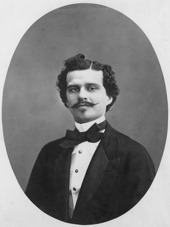 |
| Edward Strauss |
La belle Hélène (French pronunciation:
[la bɛl elɛn], The Beautiful Helen), opéra
bouffe in three acts (1864), is an operetta
by Jacques Offenbach to an original French
libretto by Henri Meilhac


Henri Meilhac
and Ludovic Halévy.

Ludovic Halévy


Ludovic Halevy and Henri Meilhac
http://offenbachcollaborateursphotos.blogspot.com/
The operetta parodies the Classical Greek
literature story of Helen of Troy and is the
second (and equally famous) of Offenbach's
highly diverting satires on a well-known
legend. The score includes some of
Offenbach's best-loved melodies.
Taking place in ancient Greece
 |
Maerten van Heemskerck: Panorama with the Abduction of Helen
Amidst the Wonders of the Ancient World
|
the story concerns the abduction (or elopement)
of the most beautiful woman in
the world, Helen (queen of Sparta),
After being promised the love of
Helen by the Goddess Venus
and then with the procurement
of help from Calchas
[Calchas ("brazen") for short, was a powerful
prophet], the High Priest of Jupiter, Paris outwits
Helen's much deceived husband Menelaus
(a miserly, vain old man)
and an assortment of royal Grecian heroess to
elope with Helen (she willingly goes with him);
an action which set off the Trojan Wars.
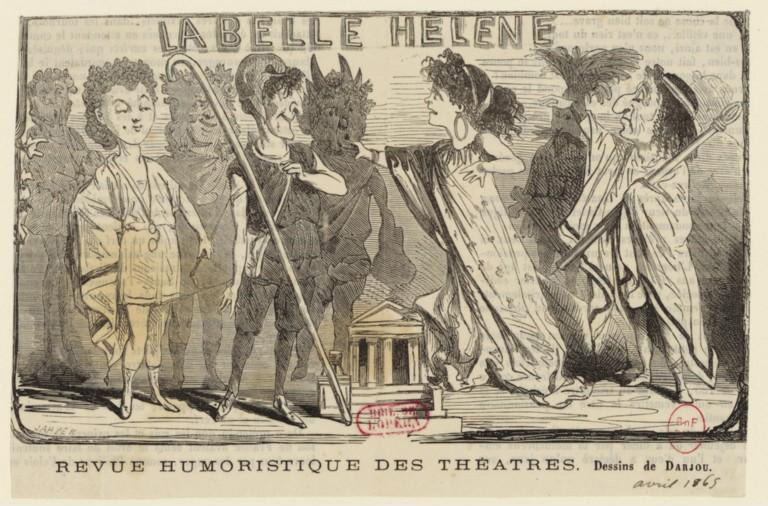
 |
| The Abduction of Helen by Gavin Hamilton, 1784 |
the world, Helen (queen of Sparta),
 |
| Howard David Johnson: Helen of Troy |
by Paris, the Prince of Troy.
 |
| Paris |
Helen by the Goddess Venus
 |
| Sandro Botticelli: The Birth of Venus |
of help from Calchas
 |
| Calchas |
prophet], the High Priest of Jupiter, Paris outwits
Helen's much deceived husband Menelaus
 |
| Menelaus and Helen |
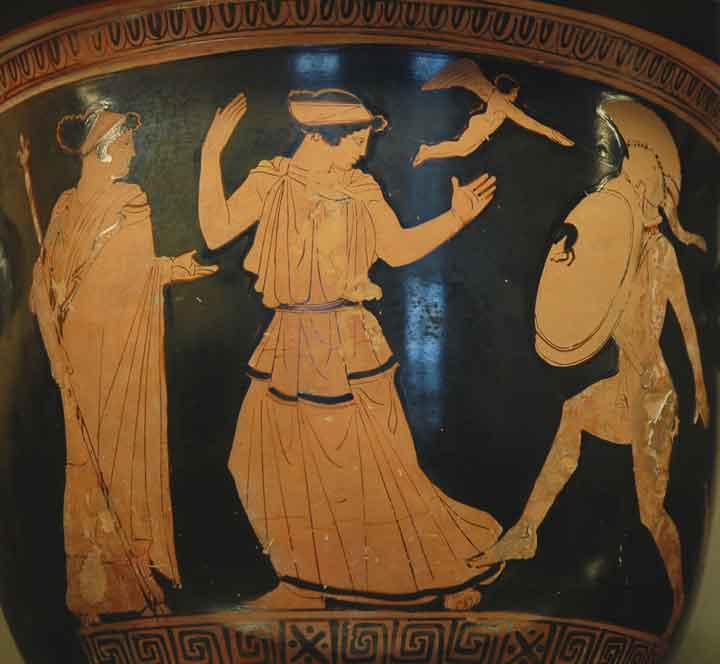 |
|
Detail of an Attic Red-Figure Crater, ca. 450 BC–440 BC,
Menelaus initially angry tries to kill Helen who tries to escape but her beauty
makes him change his opinion and he drops his sword.
Location: Louvre, Department of Greek, Etruscan and Roman Antiquities
|
elope with Helen (she willingly goes with him);
an action which set off the Trojan Wars.
 |
| Giovanni Battista Tiepolo: The Trojan Horse |

INFORMATION FROM:
The Victorian Lyric Opera Company
A Critical History of
Jacques Offenbach's
La Belle Hélène
By Roxanna Maisel
Jacques Offenbach's La Belle Hélène opened
in Paris in 1864 and was an instant hit. Loosely
based on the story of the ravishingly
beautiful Helen of Troy
from Homer's
beautiful Helen of Troy
 |
| Gaston Brussiere: Helen of Troy |
 |
| Homer |
the work also satirizes the decline of the
Second Empire in France (1852-70, under the
rule of Emperor Napoleon III).
During this era, France underwent a period of
rapid industrialization and rising prosperity
in which Paris acquired a world-
wide reputation for gaiety.
 |
Disderi, Adolphe Eugene French Emperor
Napoléon III and his Wife Eugenie, 1865
|
rapid industrialization and rising prosperity
 |
Camille Pissarro: Avenue de L'Opera Boulevard
This building plan was created by Napoleon III
requiring all buildings be the same height
with the same basic facade design.
|
 |
| The concept of the Department Store is started in France. |
wide reputation for gaiety.
 |
|
The supper offered by Napoleon III in the hall of the Opera of Versailles, August 25, 1855
|
In La Belle Hélène,

Offenbach parodied the vulgarly decadent
society of the Parisian upper class.
La Belle Hélène is an Opera Bouffe,


Offenbach parodied the vulgarly decadent
society of the Parisian upper class.
 |
| James Tissot: Portrait du Marquis de Miramon, 1865 |

 |
| Adolphe Martial Potémont: Variety Theatre (Paris) 1877 |
La Belle Hélène premiered here on December 17, 1864
starring Hortense Schneider and José Dupuis.
 |
| Variety Theatre Boulevard Montmartre |
a comic operetta in the French tradition,
so it is shocking to look back and read
the controversy surrounding Offenbach's
opera in its early days.
Reactions to the work were mixed.
As an early New York Times
As an early New York Times
reviewer wrote on April 3, 1868,
 |
"The critics have ...praised it to the skies
or condemned it to the bottomless pit."


The earliest French reviews feigned outrage.
"Masterpieces profaned!,"
lamented a January 9, 1865 review in
The Journal of Debates;
 |
a December 26, 1864 article in
The Universal Monitor
 |
| The Universal Monitor |
protests,
"To attempt to ridicule Homer's
heroes is blasphemy!"


An 1868 New York Tribune reviewer wrote,
"the text is loaded with indecent innuendoes;
the action in several places is simply vile; and
the action in several places is simply vile; and
the costumes of certain characters are more
lascivious than anything we have yet seen
in a respectable theater."
 |
| New York Tribune |
Describing the opera as,
The April 3, 1868 Times
reviewer made some concessions:
reviewer made some concessions:
"In a moral point of view there can be no
doubt that Helen was an improper person....
Society was in a loose condition....The whole
family was, to speak mildly, eccentric."

doubt that Helen was an improper person....
Society was in a loose condition....The whole
family was, to speak mildly, eccentric."

Despite the opera's indecencies, audiences
flooded the theaters to view the spectacle.
flooded the theaters to view the spectacle.
The New York Times' March 27, 1868
 |
New York Times:
March 27, 1868
|
review kindly remarks,
"the house was filled with a fashionable
and appreciative audience."

and appreciative audience."

It further memorialized that,
"The music of the opera ... has become
familiar to the public. It is light,
rhythmic and catching....Between the
music and the dialogue the audience
was kept in a constant
rhythmic and catching....Between the
music and the dialogue the audience
was kept in a constant
state of laughter."

Thankfully, it is Offenbach and his
amusing La Belle Hélène


Thankfully, it is Offenbach and his
amusing La Belle Hélène

that we remember today, not
the invective of the critics. Popular opinion has
prevailed in today's general perception of
La Belle Hélène

La Belle Hélène

as a successful work of humor
and considerable musical gifts.
Had Offenbach been around to witness
the extravagances of the 1920's,
Had Offenbach been around to witness
the extravagances of the 1920's,
 |
| http://www.siphonmanufaktur.de/en/die-soda-siphons/sparklets-london-soda-siphon-1920/ |
he would have seen for himself the
renewed relevance of his work as a social
critique of the present-day.

HELEN OF TROY

HELEN OF TROY
 |
| Dante Rossetti: Helen of Troy |
In Greek mythology, Helen (Greek: Ἑλένη,
Helénē), better known as Helen of Troy,
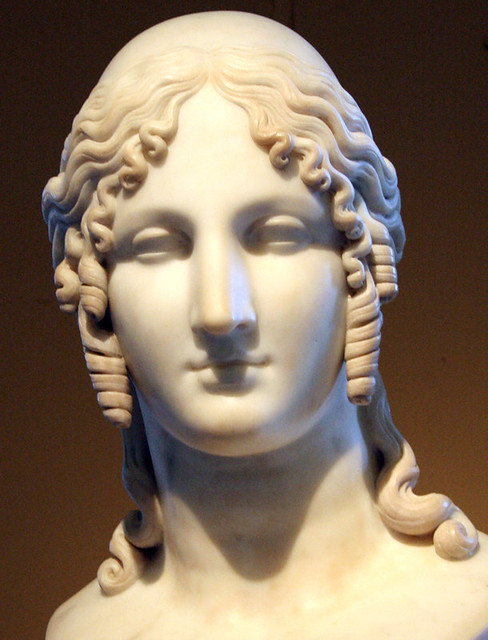 |
| Helen of Troy |
was the daughter of Zeus
 |
| Zeus |
and Leda
 |
| Ridolfo Ghirlandaio: Leda and the Swan, 1560 |
and the wife of
Menelaus, king of Sparta.
_-_n._4140_-_Roma_-_Vaticano_-_Menelao_-_Busto_in_marmo.jpg/457px-Brogi,_Giacomo_(1822-1881)_-_n._4140_-_Roma_-_Vaticano_-_Menelao_-_Busto_in_marmo.jpg) |
| Menelaus |
She was the sister of
Castor, Polydeuces,
 |
Jean Cocteau:
Castor and Pollux Ceramic Plate, 1958
|
and Clytemnestra.
 |
Philippe Chery: Clytemnestra,
Costume for Iphigenia in Aulis
from Volume II of Research on the
Costumes and Theatre of All Nations
|
 |
|
Helen of Troy and Clytemnestra are shown emerging from one egg;
Castor and Pollux emerge from the other egg.
|
Her abduction (or elopement
depending on which account is
believed) by Paris
 |
| Statue of Paris in the British Museum |
 |
| A fresco of Paris abducting Helen by force painted on a wall inside a villa in Venice, Italy. |
brought about the Trojan War.
http://www.hellenicaworld.com/Greece/Mythology/en/Helen.html


















MORE PICTURES OF
HELEN OF TROY
 |
Gustave Moreau:
Helen on the Ramparts of Troy
|
 |
Famous Women Boccaccio:
Helen, Daughter of Zeus and Wife of Menelaus
|
 |
| Salvador Dali: Helen of Troy, 1977 |
 |
| Frederick Leighton: Helen of Troy |
 |
| Edward Burne-Jones: Helen's Tears (Flower Book) |
 |
| Anthony Frederick Augustus Sandys: Helen of Troy |
 |
| Frantisek Kupka: The Crowning of Helen, 1906 |
![Franz Stuck (German 1863–1928), [Symbolism, Art Nouveau] The Beautiful Helena.](https://s-media-cache-ak0.pinimg.com/736x/78/bf/98/78bf988df5b872312ba0e23b7287a634.jpg) |
Franz Stuck:
The Beautiful Helena
|
 |
| A.K. Macdonald: Helen of Troy |
 |
| Edward John Poynter: Helen |
 |
Walter Crane:
Often She Would Stand Upon the Walls of Troy
|
 |
| Helen of Troy |
 |
| Antonio Canova: Helen of Troy |
 |
| Valery Kharitonov: Menelaus and Helen |
 |
| Angus Mcbride: Helen of Troy |
 |
| Author Unknown: The Abduction of Helena, 1450 |
 |
| Baugin Lubin: Kidnapping of Helena, c. 1670 |
 |
| Richard Westall: The Reconciliation Of Paris And Helen |
 |
Evelyn de Morgan: Helen of Troy, 1898
Helen admiringly displays a lock of
her hair, as she gazes into a mirror.
|
 |
Maria Corda:
The Private Life of Helen of Troy Costume Sketch |
 |
| Maria Cristina Haize: La Belle Helene |
 |
| Grasky: La Belle Helene |


TROY STORY
Whiteboard animation loosely
based upon Homer's Iliad
LINKS








POSTER ART
















































